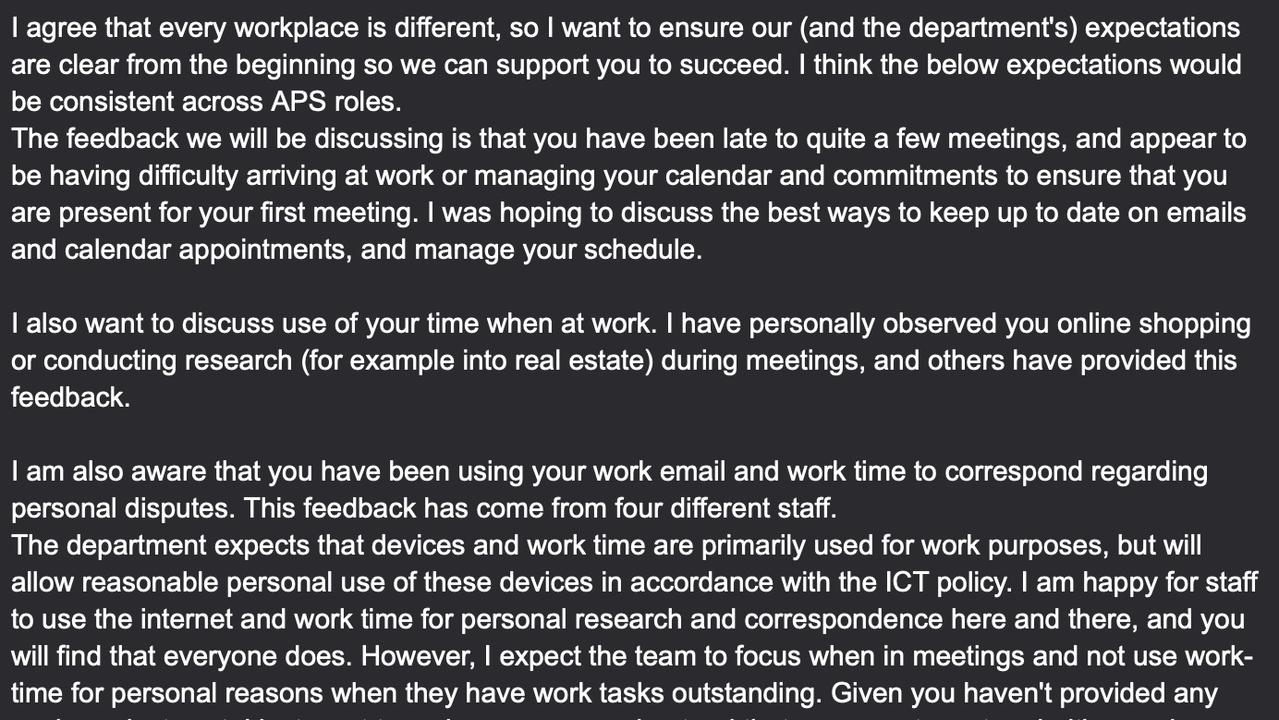Lawyer’s wild move after being caught coming in late and falling asleep in meetings
A graduate lawyer working for a government department claimed his bosses were bullying him after they asked him to show up to work on time.
At Work
Don't miss out on the headlines from At Work. Followed categories will be added to My News.
A graduate lawyer accused his bosses of bullying after a tribunal heard he was caught showing up late to meetings, falling asleep in them, and online shopping at work, among other things.
But the Fair Work Commission (FWC) ruled in favour of his employer, the Department of Employment and Workplace Relations, and found absolutely no bullying took place in a scathing decision handed down earlier this month.
In fact, the FWC noted that the junior lawyer was “belligerent” and “rude” throughout the tribunal process, including wishing his colleagues dead on the witness stand, and concluded that he was not a credible witness.
It began with the grad, who news.com.au has chosen not to name, kicking up a fuss about having to show up to work “at a certain time”, claiming this was a breach of his enterprise agreement.
He claimed he had an undiagnosed sleeping disorder and needed to work flexible hours.
From there, the young man clashed with his supervisors again and again for his behaviour in the workplace, causing him to escalate the case in the FWC.

The employee complained about having to attend training programs for between two and four hours with no breaks.
He also lodged a complaint after he was reprimanded for arriving late to two meetings.
The tribunal heard his manager sent him an email outlining his behaviour, including telling him he had been caught online shopping and browsing real estate websites during meetings.
They had also spotted him drifting off in one meeting and had heard from another colleague that he had been so deeply asleep in another he had to be roused awake.
The young lawyer had also used his government-issued work email to deal with personal disputes, the email noted.
“Mostly, I am concerned about your fatigue during training and the work day, particularly from a wellbeing perspective,” his manager wrote.
The lawyer claimed he found this email “menacing” and “accusatory”, claiming he was “victimised” and had been placed under “illegal” video surveillance to be performance managed out of the company.
It later emerged he was referring to the use of Microsoft Teams to conduct online work meetings.
“This is clearly not a matter of bullying,” FWC deputy president Lyndall Dean wrote in her decision.

The lawyer also couldn’t handle constructive criticism, the tribunal heard. After making complaints about his current manager, he was assigned a new boss. But soon they also didn’t see eye-to-eye with him.
This new manager told him “none of the tasks on your task list have been completed” and work he had turned in was not what had been asked of him.
“The document is not consistent with what we had discussed on Thursday and does not reflect the suggested headings and format set out in my detailed feedback to you on 8 April,” his boss wrote in one email.
“I am happy to discuss further with you how to synthesise this research into a memo that is useful and fit for purpose. The attached memo may be a helpful example”.
The young employee said this feedback was “condescending and stern” and sent a complaint to HR asking that he be sent criticism at a “more appropriate time” such as late in the afternoon.
That would allow him to “have had the day to complete my work and then can digest the comments in my own time”.
“I think it too distracting and cumbersome to have to deal with subjective arguments during work hours which has the potential to compound the issue and hinder my performance,” he added.
Not the first time young lawyer took matter to FWC
As well as stamping out his bullying claims, the FWC passed judgment about the lawyer’s personal conduct during the hearing.
He “has been exceptionally difficult to deal with,” Ms Dean wrote.
“Despite having completed a law degree he was unable to follow the most basic of instructions to prepare a witness statement.”
When he was asked about one of his bosses, the junior lawyer said he didn’t care whether she was dead or alive and called her a “moron” with “no credibility.”
He also expressed his regret that he “should have been nastier” towards one of his other bosses and said he “didn’t give a s**t” about his supervisor.
The problematic university graduate also wouldn’t answer questions directly during cross examination and called some questions “f***king ridiculous”.
The lawyer still currently works at the Department of Employment and Workplace Relations.
Before that, he was a legal officer with the Attorney-General’s Department.
And this is not the first time the worker has tried to take his employer to the tribunal.
In 2019, he alleged he had been unfairly dismissed by the Department of Home Affairs for non-performance of duties.
He claimed he had been absent from his role because of a “targeted bullying campaign” against him.
The FWC dismissed that case over his failure to attend hearings and submit the right documents.
Originally published as Lawyer’s wild move after being caught coming in late and falling asleep in meetings









